Estimated reading time: 11 minutes
Nowadays, there are more and more people who want to import goods from China. But this is not an easy process. It’s not just the sourcing process. If you don’t know what is the best way to pay Chinese suppliers before paying. Maybe you will get payment scams from Chinese suppliers.
Some common risks include suppliers accepting your payment but always having a reason not to deliver the goods to you. Maybe you paid all your money, but your supplier says you didn’t receive it.
No one knows where your money went, or worse, after payment, the supplier just stops responding. Tales like these are more common than you’d think, yet they’re also avoidable.
In this article, I will analyze what is the best payment methods for Chinese suppliers. And provide you with some tips and notes to help you pay your Chinese suppliers safely and securely.
Payment Scams from Chinese Suppliers
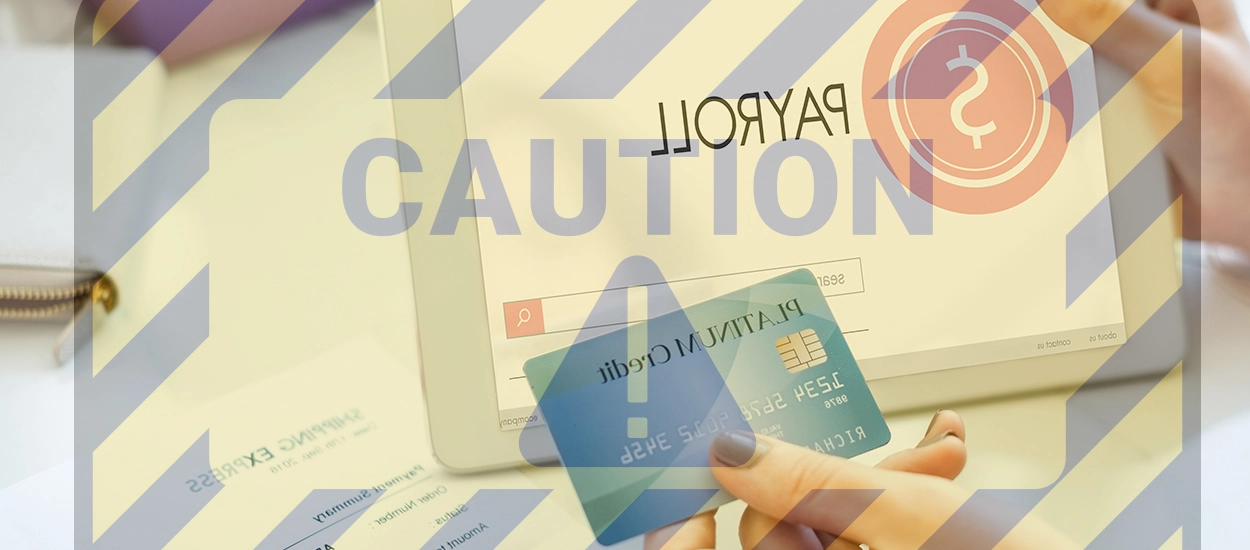
Many people may overlook the issue of choosing the best way to pay Chinese suppliers because they don’t know what risks will occur during the process. Below, I will list these common risks:
A) Funds are lost: You paid a Chinese supplier, but he reported that he did not receive your money. You also don’t know where your money is. The U.S. Small Business Administration (SBA) warns that verifying the recipient’s banking information is crucial in international trade.
B) Different languages lead to inconsistent prices because of the different currencies used. The amount you paid is too high or too low.
C) Conflict on transaction records: Your supplier has questions about the transaction. But you cannot provide proof of transaction records. This may cause you to lose the trust of your supplier.
D) Quality doesn’t meet expectations: When your supplier receives money. There may be a lack of emphasis on your product, which will result in the quality of your product not achieving the results you want. It will seriously affect your product sales and brand value.
E) You may encounter fake companies: Some companies from China pretend to be Chinese suppliers. When you give them your money, they won’t respond to your emails. Of course, the product will not be provided to you. Because they are not a legitimate company at all.
Recommend Reading: How to Verify a Chinese Supplier’s Legitimacy: 8 Ways to Solve
What Is the Best Way to Pay Chinese Suppliers?
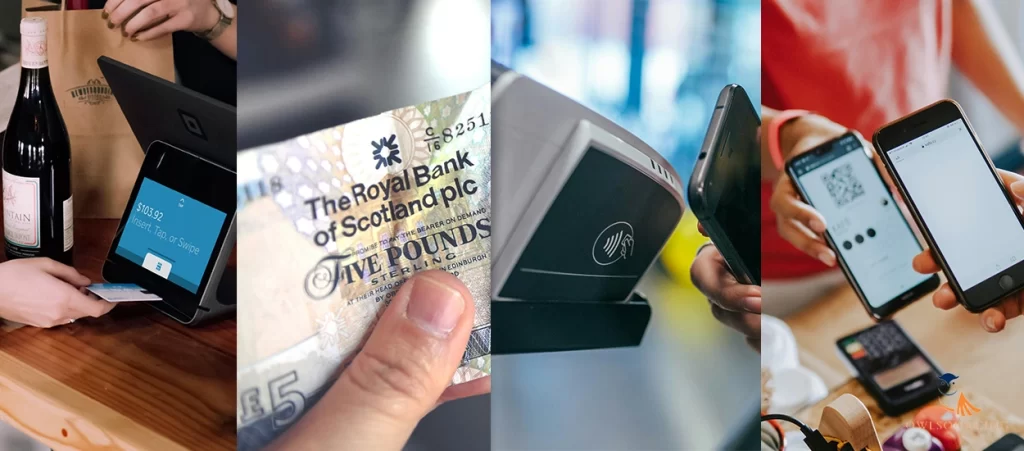
Although the purpose of this article is to show you the best way to pay Chinese suppliers, the answer is not fixed. Because each payment method has its advantages and disadvantages. However, I will list them all. You can choose the most suitable method to pay your Chinese suppliers based on your needs.
1. Using Telegraphic Transfer (TT)/International Wire Transfer to Pay Suppliers
International wire transfers are often called Telegraphic Transfers. It is a common way for businesses around the world to pay their suppliers. This method can also be used by suppliers in China.
You can use international wire transfers to send payments directly from your bank account to your Chinese supplier’s bank account. This process is facilitated by a global banking system that allows funds to be transferred efficiently and securely across borders.
Pros,
- Widely Accepted: TT is a standard payment method, making it readily accepted by most suppliers in China.
- Provides Clear Transaction Records
- Fast Transfer Speed: Wire transfers can usually be completed within a few days. This helps you process orders and ship orders promptly.
Cons,
- No Payment Protection
- Transfer Fees: Yes, there may be some additional costs for you and your suppliers. Banks often charge fees for sending and receiving international wire transfers. And exchange rates may differ. These costs vary depending on the participating bank and the amount transferred.
2. Letter of Credit

Letter of credit is a widely used financial instrument in international trade. It provides a guarantee that the buyer’s bank will pay the seller’s bank. But only if the conditions specified in the letter of credit are met. Otherwise, you may find yourself unable to pay.
If you have not done business with this Chinese supplier. This method can also help you verify whether the supplier is legitimate. Not a scam company.
Pros,
- Risk reduction
- Structured Transaction
- Payment Method is More Secure
Cons,
- Low Flexibility
- Take a Long Time
- Only for Larger Transactions
- Good Credit Profile Required
3. Considering Escrow Services to Pay your Suppliers

LianLian Global’s cross-border full-value payment guarantee is a new feature introduced to the company’s recently launched international digital wallet. The policy assures that payments to China-based suppliers are delivered to the right bank account — every time.
All payments on LianLian Global’s end-to-end payments network are vetted and verified through LianLian Global’s enhanced KYC capabilities, which support additional due diligence on customer profile checks. These checks mitigate payment risks and fraudulent transactions while satisfying regulatory compliance in the Chinese market.
Through this report from PRNewswire, we can see that such services are gradually becoming popular.
When you use an escrow service, you need to deposit the money in advance into an account managed by a third party. The funds are held in custody by this third party.
Until you confirm receipt of the goods or services and are satisfied with them. Only then will it transfer funds to the account of Chinese suppliers on your behalf.
Some Chinese suppliers are not proficient in English. Just like you may not be familiar with Chinese. However, the presence of a third party can help clarify terms.
Make sure both parties have a clear understanding of the terms of the deal. Helping you deal with language barriers or different business cultures.
Normally, if you buy products on Alibaba. May be hosted using Alipay.
Pros,
- Risk Reduction for you
- Transparent Process
Cons,
- Additional Costs
- Process is Slow
- Dependency on Service Provider
4. PayPal
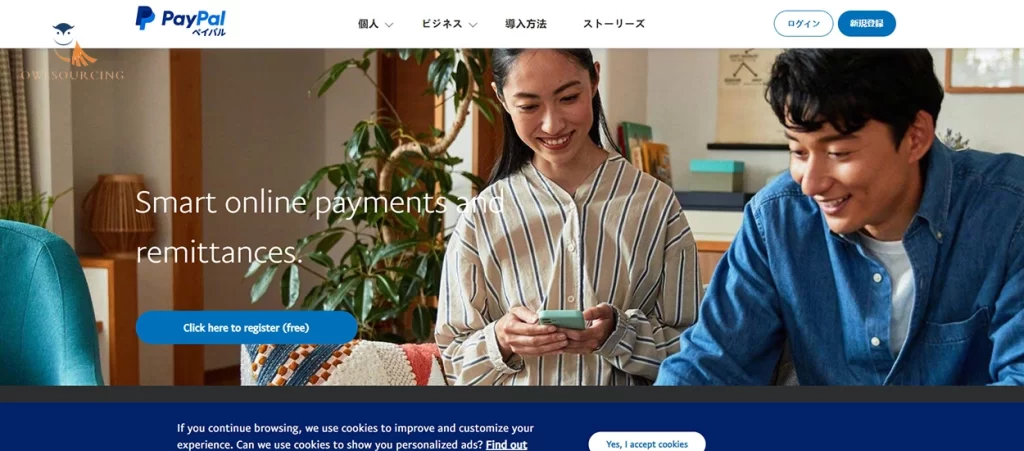
PayPal provides a safe and convenient way to conduct transactions. It has now developed into one of the most popular payment methods in the world. It is especially praised for its user-friendly interface and strong security measures.
PayPal allows individuals and businesses to send and receive money electronically, making it ideal for international transactions, including payments to suppliers in China.
However, it is the same as most payment methods. There are also additional fees for using PayPal.
Pros,
- Fast Transactions
- Currency usage flexibility
- Ease of Using
Cons,
- Additional Charges
- Limited for Larger Transactions
5. Western Union
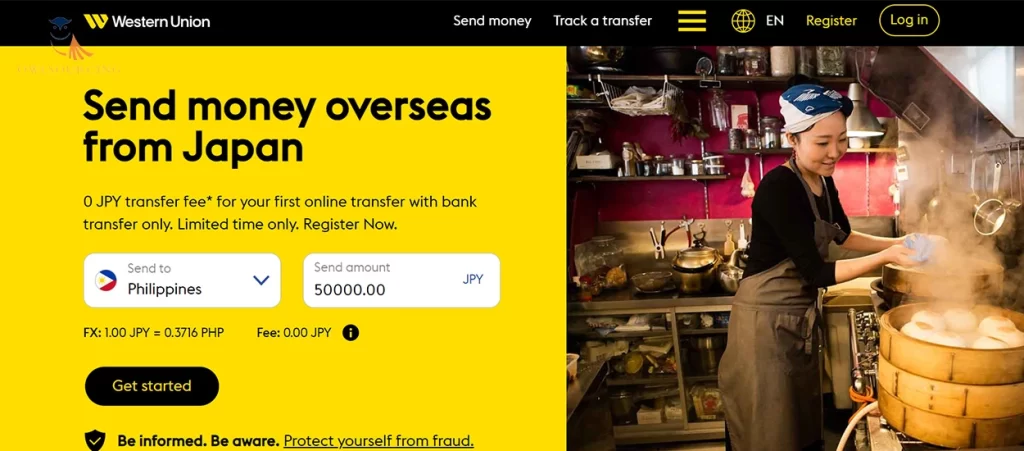
Western Union operates in more than 200 countries and territories, enabling individuals and businesses to easily transfer money across borders.
Unlike other methods, Western Union transfers are very fast. Funds arrive in the supplier’s account within minutes.
This method is therefore suitable when your suppliers need you to pay them urgently. But please make sure the account is secure before transferring money. Because if the other party embezzles your money. There’s nothing Western Union can do either.
Pros,
Transfer Speed is Fast
Wide Global Coverage
Cons,
- High Transfer Fees
- Limited Transfer Protection
- Not Suitable for Large Transactions
6. WeChat & Alipay

WeChat and Alipay are common payment methods in China. Almost everyone has WeChat and Alipay on their mobile phone. If your Chinese supplier is small, they may prefer either approach. However, this method is more suitable for users who frequently have financial transactions with Chinese suppliers.
Pros,
- Easier to Use in China
- Convenience of Use
- Comprehensive Service
Cons,
- Need a Chinese Account
- Only in RMB
- International Transactions are Subject to Limits
7. Cash

Yes, this is probably the most direct way. You can give your supplier USD or RMB directly. Maybe cash has become rare in today’s transactions, but you can’t deny its role in transactions.
However, try to minimize the use of direct cash. One aspect is that cash can easily be lost. The flip side is the potential embarrassment to your suppliers.
Imagine you meet with your Chinese supplier. But you shelled out a lot of cash. This may raise eyebrows among suppliers.
Pros,
- No Extra Cost
- Direct Deal
- Easy to Trade
Cons,
- Risk of Theft or Loss
- No Transaction Records are Kept
- Not Suitable for Large Transactions
- Carrying Large Amounts of Cash Seems Strange
8. China Sourcing Agents
Suppose you are working with Owlsourcing to help you source products from China. You don’t have to worry about how to pay your Chinese suppliers.
You can trust our expertise and reduce most of the associated risks. Owlsourcing provides such services to deal with supplier payments efficiently, with minimum complications, transparently, and with minimal risk of many types of issues that importers usually experience.
However, no solution can be fully fail-safe. While Owlsourcing does all it can to minimize risk, results may vary due to supplier cooperation, delays in the process, or changes in regulatory compliance.
Working with a good, trustworthy China sourcing agent such as Owlsourcing offers many advantages, but communication should always be open, agreements should be thoroughly reviewed, and one should be informed about the sourcing and payment process for smooth operations.
You can check another article about: What a China Sourcing Agent do.
| Payment Method | Risks | Pros | Cons |
|---|---|---|---|
| Telegraphic Transfer (TT) | No payment protection, transfer issues | Widely accepted, clear records, fast processing | Transfer fees, currency exchange costs |
| Letter of Credit (LC) | Low flexibility, requires a good credit profile | High security, reduces risk, structured transaction | Time-consuming, expensive, suitable for large deals |
| Escrow Services | Dependency on the service provider, slow process | Risk reduction, transparent, and resolves disputes | Additional costs |
| PayPal | Limited for large transactions, fees | Fast, user-friendly, multi-currency | High charges, not ideal for large payments |
| Western Union | No recourse if funds are misused | Rapid transfer speed, wide global coverage | High fees, limited protection, unsuitable for large deals |
| WeChat/Alipay | Transaction limits, RMB-only | Convenient in China, widely used locally | Requires a Chinese account, limited internationally |
| Cash | Risk of theft/loss, lack of documentation | No extra fees, direct settlement | Unsuitable for large deals, perceived as unprofessional |
| Sourcing Agents | Dependence on agent reliability | Handles payment and communication risks | Additional costs |
Key Recommendations:
- Choose “Escrow Services” or “Letter of Credit” for high-security transactions.
- Use “PayPal” or “Telegraphic Transfer” for moderate amounts with faster processing.
- Avoid “Western Union” or “Cash” unless dealing with good suppliers in urgent situations.
How to Avoid Common Payment Scams When Paying Chinese Suppliers?
Avoiding common payment scams when paying Chinese suppliers is important to ensure safe business transactions. Here are some tips to help reduce the risk of falling victim to this type of scam:
1. Investigate Chinese Suppliers in Detail Before Paying
If possible, you can buy a plane ticket to China to visit the supplier’s factory in person. It may increase the cost, but it is very necessary.

Only by visiting a factory in China in person can you decide whether to cooperate with them.
Seeking reviews or feedback from previous customers can also provide valuable insights. You can check the social reputation of the company through Google search and other methods. Ensure the legitimacy and reputation of this Chinese supplier.
2. Record All the Information

Document every interaction, agreement, and transaction in detail after it occurs. Record communications such as emails, chats, and meeting notes. These records should include details about the products or services purchased, pricing, delivery terms, and any other relevant conditions agreed upon.
Having a comprehensive documentation trail not only provides a clear reference for both parties. And they are also important evidence in the event of any discrepancies or disputes. Even if fraud occurs, these records can help you resolve the issue.
Keeping detailed financial records can help you maintain your property. This includes invoices, receipts, payment confirmations, and bank statements related to supplier transactions.
Carefully tracking payments can help identify any unauthorized or suspicious transactions.
It is also critical to verify that payment details and payee information match the supplier’s official information. Inconsistencies in bank accounts or payment details can be a sign of potential fraud.
3. Do Not Transfer Money to a Personal Account
In legitimate business transactions, especially in a B2B environment, payments are typically made to a company’s official bank account rather than an individual’s private account.
This is a standard business practice as it ensures transparency and accountability. When a supplier insists on having money wired into a personal account, this needs to raise major red flags.
Such requirements often indicate a lack of formal business structure. Or in worst cases, with the intent to commit fraud.
Additionally, paying into a company’s official account allows for better documentation and legal recourse in the event of any disputes or fraudulent activity.
Official transactions are usually accompanied by formal invoices, contracts, and receipts, which serve as legal proof of the transaction. These documents can be used in legal proceedings if necessary, so they are indispensable.
This is a common experience for overseas customers. Usually, when a retailer requests that the buyer pay to a personal account, the buyer hesitates and cancels the transaction. Subsequent investigation usually shows that the retailer is not affiliated with the company.
The Best Payment Methods for Chinese Suppliers
Each payment method has its advantages and disadvantages. Choose the one that best suits your transaction’s scale, urgency, and risk tolerance.
| Payment Method | Ideal For | Additional Notes |
|---|---|---|
| Telegraphic Transfer (TT) | Businesses with trusted partners | Use verified bank accounts; refer to SWIFT for secure banking codes. |
| Letter of Credit | Large transactions | Supported by most international banks. UCP 600 Rules ensure compliance. |
| Escrow Services | First-time buyers | Alibaba’s escrow, Alipay, and LianLian Global offer trusted services. |
| PayPal | Small to medium transactions | Refer to PayPal Buyer Protection for dispute resolutions. |
| Western Union | Urgent, low-value transactions | Ensure recipient legitimacy through direct confirmation; visit Western Union. |
| WeChat/Alipay | Frequent transactions with smaller suppliers | Popular for small suppliers; see Alipay International. |
| Cash | Local, in-person deals | Avoid large sums; may conflict with local regulations like AML laws. |
| Sourcing Agents | Large-scale or complex sourcing projects | Choose reliable agents; verify credentials with Trade Associations. |
More Related Articles,
Final Thoughts
All in all, please choose the best way to pay Chinese suppliers based on this article. Maybe there are some disadvantages to each approach. However, just like there is no perfect leaf in the world.
You just need to make sure your payments are safe. However, the final payment choice needs to be based on your specific situation. Of course, you can contact us. Tell us your specific requirements. Owlsourcing can help you communicate with Chinese suppliers.

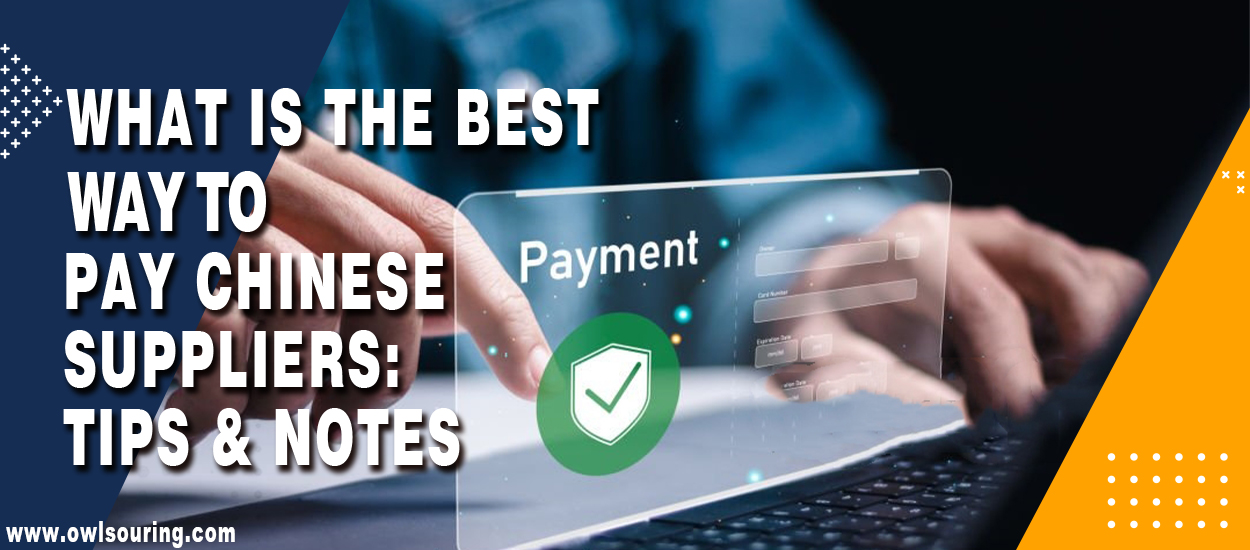

2 thoughts on “What is the Best Way to Pay Chinese Suppliers?”
This article provided some great insights into the best ways to pay Chinese suppliers. I found the breakdown of payment methods and their pros and cons to be very helpful. It’s important to consider factors like fees, security, and convenience when choosing a payment method for international transactions. Overall, this article will definitely guide me in making informed decisions when dealing with Chinese suppliers.
Thank you so much for leaving a message to share your feelings and learnings, Tony! I’m glad to know that this article’s in-depth analysis on how to pay suppliers in China was helpful to you. Indeed, when choosing a payment method for international transactions, it is crucial to consider factors such as fees, security, and convenience. Our goal is to help readers make more informed decisions by providing these detailed comparisons.